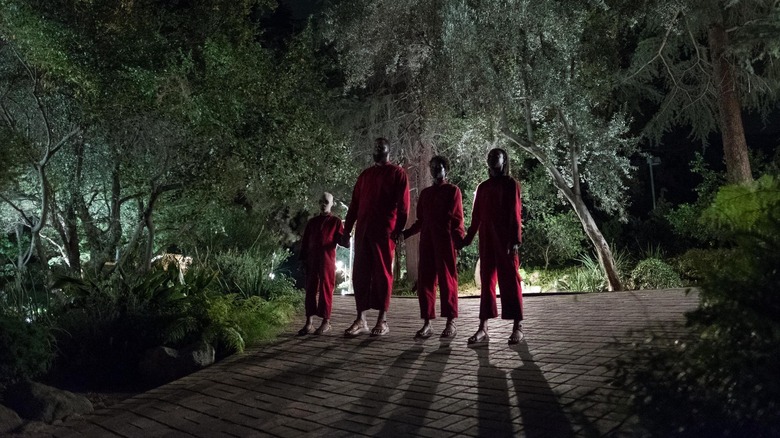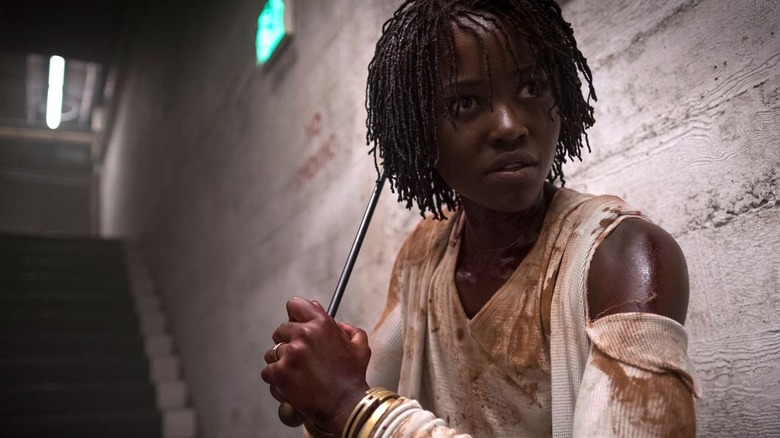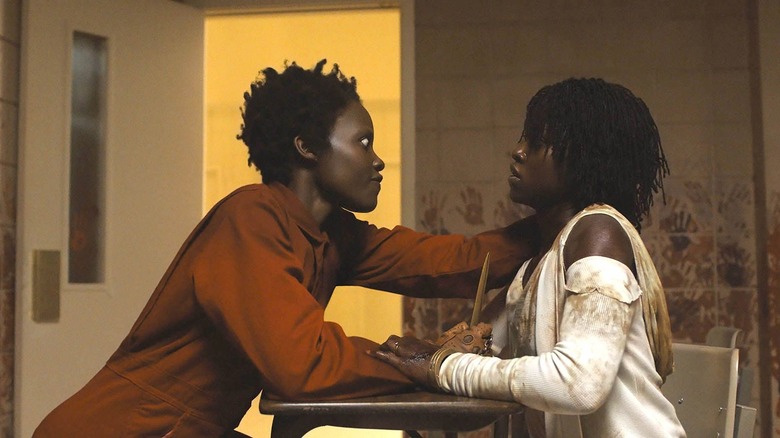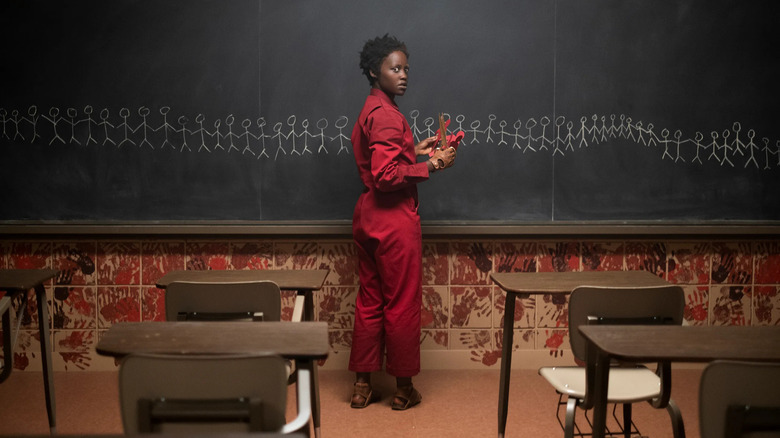One Of The Scariest Scenes In Us Wants To Come Inside
(Welcome to Scariest Scene Ever, a column dedicated to the most pulse-pounding moments in horror with your tour guides, horror experts Chris Evangelista and Matt Donato. In this edition, Matt definitely has not been replaced by his Tethered and "Us" was for sure his choice.)
In honor of Jordan Peele's third thunderous horror release this weekend — sci-fi western "Nope" — let's look backward on the domestic nightmares he's already created. Specifically, 2019's doppelgänger mystifier "Us." Peele clasps hands across America and introduced audiences to their Tethered others, using red jumpsuits and gold scissors to sell two different worlds. Those who thrive above and those who remain hidden down below, out of sight and mind.
While it's my opinion that "Get Out" is the tighter, more theatrically composed Peele release, "Us" takes even wilder swings and lets its performers create nightmarish alternate personalities. Lupita Nyong'o, Winston Duke, Shahadi Wright Joseph, and Evan Alex play subterranean versions of their topside selves in a fit of horrific mimicry. There's always something off about their duplicate selves, from how they scamper behind shadows or ditto habits like aliens learning to be human. Peele tells an uprising story of secluded classes, using 1980s references and a representation of two Americas that collide full-speed.
The setup
Adelaide "Addy" Wilson (Lupita Nyong'o) is introduced first as a child in the summer of '86 on a beachy family vacation. Addy wanders away from supervision and enters the Santa Cruz Boardwalk's house of mirrors. As she glimpses herself repeatedly, she runs into a breathing Addy replica, unlike all the other reflections in the funhouse. This one is a flesh-and-blood girl who looks exactly like Addy, as real-life Addy gazes in inexplicable horror at the mystery girl staring back.
Peele jumps forward to an adult Addy going on vacation with her husband Gabriel "Gabe" Wilson (Winston Duke) and two children, Zora (Shahadi Wright Joseph) and Jason (Evan Alex). We're shown Adelaide's past to understand her current apprehension, which she attempts not to let dampen the beach hangs and motor-boating. Adelaide's trauma is specific but not strong enough to stop her from living an everyday life with Gabe and their offspring. Adelaide will make the most out of her vacation, hoping — unsuccessfully — whatever happened was a one-time freak occurrence.
The story so far
At the beach, the Wilsons unite with family friends Josh (Tim Heidecke) and Kitty (Elisabeth Moss) Tyler, along with their twin daughters Becca (Cali Sheldon) and Lindsey (Noelle Sheldon). There's nothing out of the ordinary until Jason notices something — possible doppelgänger behavior. An older man with bleeding wounds is spied being taken away by responders as the Wilsons' car rolls towards their sunny destination, the same man Jason later sees with blood on his hands. One bleeding, the other caught red-handed. Unfortunately, that's just the beginning of the Wilsons' vacation troubles.
Addy hasn't yet confided in Gabe about the obscure childhood encounter, which she attempts to do after a day of schmoozing with the Tylers. After the Wilsons return to their current digs, Addy starts to reveal to Gabe what her younger self saw in that Santa Cruz funhouse — then Jason interrupts with a disturbing claim. "There's a family in our driveway." Gabe, Addy, and Jason peer out their foyer window at the silhouettes of four figures holding hands and standing in the Wilsons' driveway. Not moving, just forming a human wall at their driveway's exit.
The scene
"Huh, who is that?"
Gabe doesn't seem too concerned about the family outside, but Addy is panicked by their stationary trespassers. She starts breathing quicker, backing away from the window and demanding Zora's phone. Gabe assumes they're harmless neighbors and isn't on board with Addy's call to local law enforcement. It'll be fifteen minutes before the police arrive, but Gabe doesn't think the intervention is necessary. Addy begs him to stay inside, but he asks for only a minute to deescalate the situation.
It's almost as if Addy recognizes the imminent danger that no one else sees, made more evident on a second or more viewing.
Gabe starts with friendly banter, a "Hi' and some questions, but the statuesque family remains silent atop the Wilsons' driveway. Gabe warns the group that if they're trying to scare his family, they've picked the wrong house for their prank — but he's still met with no response. Addy instructs Zora to put her shoes on, now expecting danger. Gabe reaches his brink outside, concluding that more threatening matters are required. It's time to up the ante, as he asks Zora for a baseball bat.
It's time for Gabe to go alpha. "I've got this; I've got this." Addy's husband struts back outside with an aluminum baseball bat and lays down the law. "If y'all wanna get crazy, we can get crazy," he promises the disturbingly motionless randos who still haven't moved from a streetlight's perfect glow in the background. After Gabe notifies everyone that the cops are on their way, one of the uninvited guests makes a throat noise that sends the two outside flanking persons sprinting to both sides of the house. A beefier, more imposing character — the third of four unknowns — starts bounding towards Gabe. The hornets have been antagonized, and now they're on the attack. It's such an effective use of shadows, silence, and sustained dread as Peele achieves a top-notch "Aw hell no!" moment that rang through my theater like "Jaws" had popped out of the water for the first time.
The impact (Chris' take)
I remember that when "Us" came out, some people didn't quite know what to make of it. The film was denser and more layered than "Get Out," and certainly had less crowd-pleasing moments than Jordan Peele's feature directorial debut. But the many, many layers are part of what makes "Us" so special. I liken it to Kubrick's "The Shining," not in terms of plot or quality, but in the way the film has so many details packed into each frame that obsessive studying and analyzing is required.
The brilliance of "Us" is the way it just keeps building. After the creepy opening, the film settles into a more "normal" territory, and yet the unease remains. The central family is on vacation at a bright, sunny spot — and yet we can't shake the feeling that something is going to go horribly wrong at any moment. It's like we can feel it in the air, like thunderstorm clouds swirling on a particularly humid day.
Eventually, the scene Matt is highlighting arrives, and Peele stages it in such a mysterious, disturbing way that it's almost unbearable. By now, the tension has just built, and built, and built, and we're dying for some sort of release. And here the release comes — the threat feels genuinely dangerous in how inexplicable it all is, and we know that things will only get increasingly off-kilter from here.



